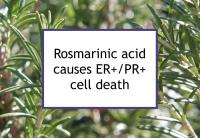Rosmarinic acid, a compound found in members of the mint family, has been reported to inhibit hormone receptor positive (ER+/PR+), HER2 overexpressing (HER2+) and triple negative (ER-/PR-/HER2-) breast cancer through several mechanisms. Now a new study has reported that rosmarinic acid can cause ER+/PR+ cell death by inhibiting integrin-linked kinase (ILK).
ILK is an enzyme with multiple functions. It has an important role in cell adhesion, functioning as a type of scaffold connecting integrins (a variety of cell surface protein) to the actin cytoskeleton, thereby helping determine cell shape, motility, and adhesion. Mammary cell expression of ILK in transgenic mice induces hyperplasia and tumor formation. In fact, ILK overexpression is frequently observed in various cancers, contributing to tumor growth, invasion, and metastasis. The authors of the current study began by screening for molecules that would inhibit ILK.
Food sources of rosmarinic acid
The following culinary herbs are good sources of rosmarinic acid, while also having been reported to have chemopreventive properties:
Sage and mint are also rich sources of rosmarinic acid, but we do not recommend them for breast cancer patients and survivors because of their hormonal effects.
Culinary herbs spices should be consumed in moderation. Most herb oils and concentrates ought to be consumed infrequently in modest amounts or avoided (see the relevant food web page). For example, basil pesto incorporates eugenol (the amount depends on the basil variety) which, while it does have anti-cancer properties, is toxic enough to suggest that basil pesto should be consumed in modest amounts up to once per week rather than on a daily basis.
Latest research finds rosmarinic acid can cause ER+/PR+ cell death
The study referenced above was designed first to identify natural compounds that could act as potent inhibitors of ILK. Having identified rosmarinic acid after screening multiple natural compounds, the authors then studied the interactions of rosmarinic acid with ILK and breast cancer.
Rosmarinic acid was shown to have high binding affinity for ILK without affecting ILK stability, a finding suggesting that rosmarinic acid would inhibit the activity of ILK. Treating MCF-7 ER+/PR+ breast cancer cells with rosmarinic acid (at IC50 dose: the concentration where the response is reduced by half) resulted in significantly reduced expression of ILK.
Rosmarinic acid treatment also resulted in cell cycle arrest (in the G0/G1 phase of the cell cycle) and apoptosis (a type of programmed cell death) in the breast cancer cells. In addition, rosmarinic acid significantly reduced the production of reactive oxygen species. Taken together, the findings demonstrate that rosmarinic acid has significant inhibitory activity against ILK. The authors conclude that rosmarinic acid has the potential to emerge as an effective ILK inhibitor with anticancer activities, possibly leading to its use in the treatment of breast cancer, among other cancers.
Please see our article on foods to eat and avoid for ER+/PR+ breast cancer and the rosmarinic acid tag for more information.
